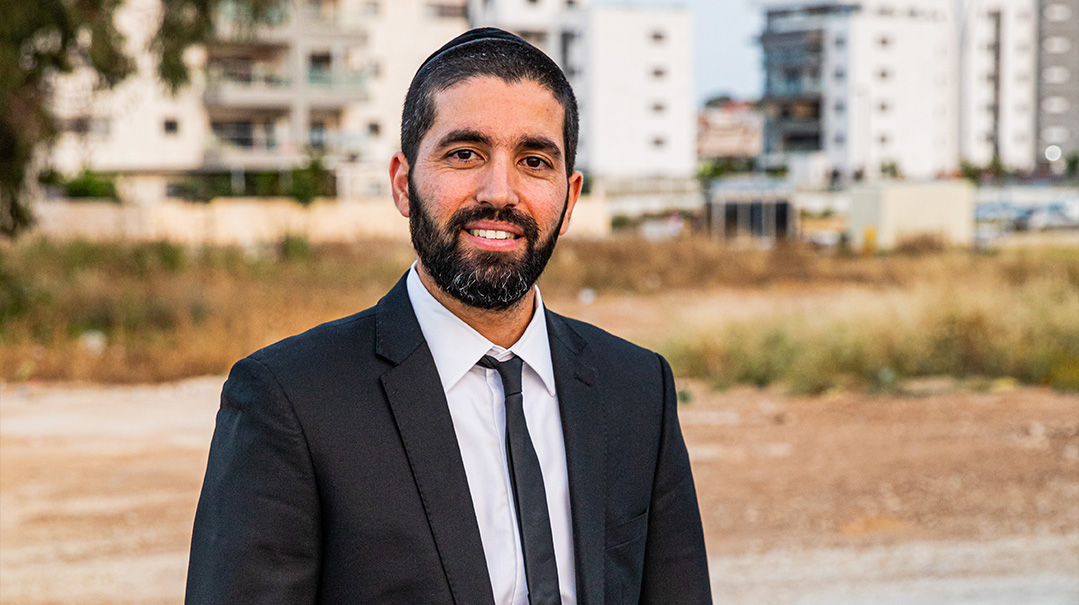Life Goals

Snir Gueta traded soccer stardom for Shabbos

Photos: Mendi Kurant
It’s deep into the second half of an Israeli professional soccer game one Sunday afternoon in 2011 when a midfielder takes possession of the ball.
The player’s lithe build marks him out as an athlete, someone to watch; but it’s the way that the ball seems to stick to his boots that makes the spectators sit up.
As the man with the intense, dark face evades one onrushing defender and closes on another, the crowd buzzes.
With another feint, the white-shirted attacker finds himself in open space in the other team’s half, separated from an open goal only by the goalkeeper. There’s a collective holding of breath as he draws back his lethal right foot, and suddenly the crowd roars as the low shot bulges the net.
The show isn’t over yet, though as the bare-headed midfielder wheels away in a celebration that makes for an odd sight in this secular world of pro-soccer.
As his teammates rush to mob him, the goal scorer peels back his team shirt to reveal another layer — a white shirt emblazoned with a large legend: “Ein Od Milvado.”
Unknown to the fans who’d come to see Snir Gueta, the goal scorer that afternoon, they’d just seen something historic. Not because of the setting: the second-tier game was a far cry from the packed stadium and high-stakes soccer that the young star had played just a short time before.
But because the strike — accompanied by its fervent declaration of faith — was Gueta’s swan song in professional sports.
Just a short time later, the Eilat-born midfielder — groomed since childhood for soccer stardom, idol of countless fans — would hang up his boots, walk away from the adulation of professional soccer, and head for the beis medrash.
“I realized that I wasn’t on the right path as a Jew because of the chillul Shabbat,” he says. “I had two choices: either wait till retirement at 35 to be chozer b’teshuvah, or I could be a man and do what Hashem wants from me now.”
In the sports-mad world of secular Israel, Gueta’s decision to quit was a big deal. It triggered a backlash from fans, friends — and most distressing, from close family.
Having sacrificed everything so that their gifted son could play elite soccer and take a shot at international stardom, Snir Gueta’s parents — themselves traditional and Shabbat-observant — were horrified that their son had thrown it all away for the $400 stipend that he would bring home as an avreich.
More than a decade after he left the glare of the television cameras behind, Snir Gueta is back under the spotlight, as one of Israel’s most sought-after kiruv speakers.
Where once he was the subject of breathless commentary, he does the talking nowadays, keeping large audiences rapt with a mixture of Torah, faith, and life-wisdom.
His rags-to-riches take of soccer success has been replaced by a similar meteoric rise as a spiritual influencer as he builds a new shul and heads a community in Sderot, the city under fire on Gaza’s border.
The story of the soccer player-turned-rabbi is far bigger than just one man’s journey. In essence, his is the tale of countless mesorati Israelis, those who — like the young soccer star Gueta once was — live on the faultline between tradition and secularism, making Kiddush on Shabbat but struggling when life clashes with faith.
“Millions of Jews in this country, the amcha who have only love for tradition, are ready to change their lives,” he says. “Soccer was once my life’s goal, but my dream is now to help them do that.”
Oops! We could not locate your form.







